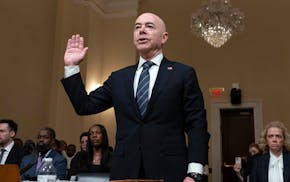ST. PAUL, Minn. — A Minnesota lawmaker apologized Monday for his tweet about NBA players that some saw as racist, saying he was rightly held accountable for inaccurate stereotyping.
State Rep. Pat Garofalo, a fifth-term Republican from the St. Paul suburb of Farmington, tweeted Sunday night: "Let's be honest, 70% of teams in NBA could fold tomorrow + nobody would notice a difference w/ possible exception of increase in streetcrime."
Garofalo initially stuck by his words even after they drew hundreds of negative comments and more than 1,000 retweets, insisting they were misinterpreted.
But in his statement Monday, he said he'd reconsidered.
"I sincerely apologize to those who I unfairly categorized," said Garofalo, who's seeking a sixth term in the fall. "The NBA has many examples of players and owners who are role models for our communities and for our country. Those individuals did not deserve that criticism and I apologize."
About three-fourths of the NBA's players are black, according to a 2013 report card from The Institute for Diversity and Ethics in Sport.
Garofalo also apologized for remarks about the NBA's policy on drug enforcement, saying it was stronger than he believed. The NBA is the only pro league in the U.S. that randomly tests players for marijuana four times per year.
Later, he told reporters that he didn't have a racial motivation for the tweet.
"I don't have a racist bone in my body. I pride myself on the fact I've tutored in inner-city Minneapolis," Garofalo said, adding there are "no excuses. I apologize. I'm responsible for my actions."
Sunday's blunt Twitter commentary was nothing new for Garofalo, who regularly makes sharp-tongued speeches on the Minnesota House floor and even edgier remarks online.
His Twitter feed is a mix of sarcastic takes on politics, pop culture and sports. During football and NASCAR seasons, he offers his predictions via his pet, "Buddy The Sports Gambling Dog."
"If the bird watching, hippy, tofu-eating vegan liberals in Minneapolis had their way, the Iron Range never would have mined taconite either," he tweeted last month, referring to a statewide debate over a proposed mine in northern Minnesota.
Despite his tendency for partisan rhetoric, Garofalo departed from conservative orthodoxy on at least one major issue. Last year, he was one of four House Republicans who voted in favor of legalizing gay marriage. The vote complicated re-election campaigns of other Republicans who also voted in favor, but Garofalo won his local GOP endorsement last month and has plenty of money banked for his race.
He also voted for bills to give the Minnesota Vikings and Minnesota Twins new stadiums. The Vikings bill also gave Minneapolis clearance to upgrade the arena where the state's NBA team — the Minnesota Timberwolves — play.
The Timberwolves were reluctant to comment on the situation when approached by reporters after practice.
"That has nothing to do with us," coach Rick Adelman said. "I don't see any reason anybody has to say anything about it. I've never even heard of the guy. I don't know who he is."
"The public's reaction speaks for itself," shooting guard Kevin Martin said.
"We expect more from our elected officials," NBA Players Association acting executive director Ron Klempner said. "Otherwise we don't think we should dignify it with a response."
The last time a Timberwolves player ran into legal trouble was in 2010, when Michael Beasley, who's now with the Miami Heat, was ticketed for speeding and possessing marijuana in a Twin Cities suburb.
Garofalo is the second Minnesota legislator in the last year whose tweets attracted national attention and accusations of racism. In June, Democratic Rep. Ryan Winkler of Golden Valley apologized and deleted a tweet that referred to Supreme Court Justice Clarence Thomas as "Uncle Thomas" following a ruling on the nation's landmark voting rights law.
Rep. Dan Schoen, a Democrat, said he doesn't think Garofalo is racist based on past public and private statements.
"Sometimes people forget when they are in certain positions what they say can have a lasting effect on people's impression upon them and the rest of legislators they serve with," Schoen said.
New Black congressional district in Louisiana bows to politics, not race, backers say
Trump trial jury selection process follows a familiar pattern with an unpredictable outcome
Climate change concerns grow, but few think Biden's climate law will help, AP-NORC poll finds
